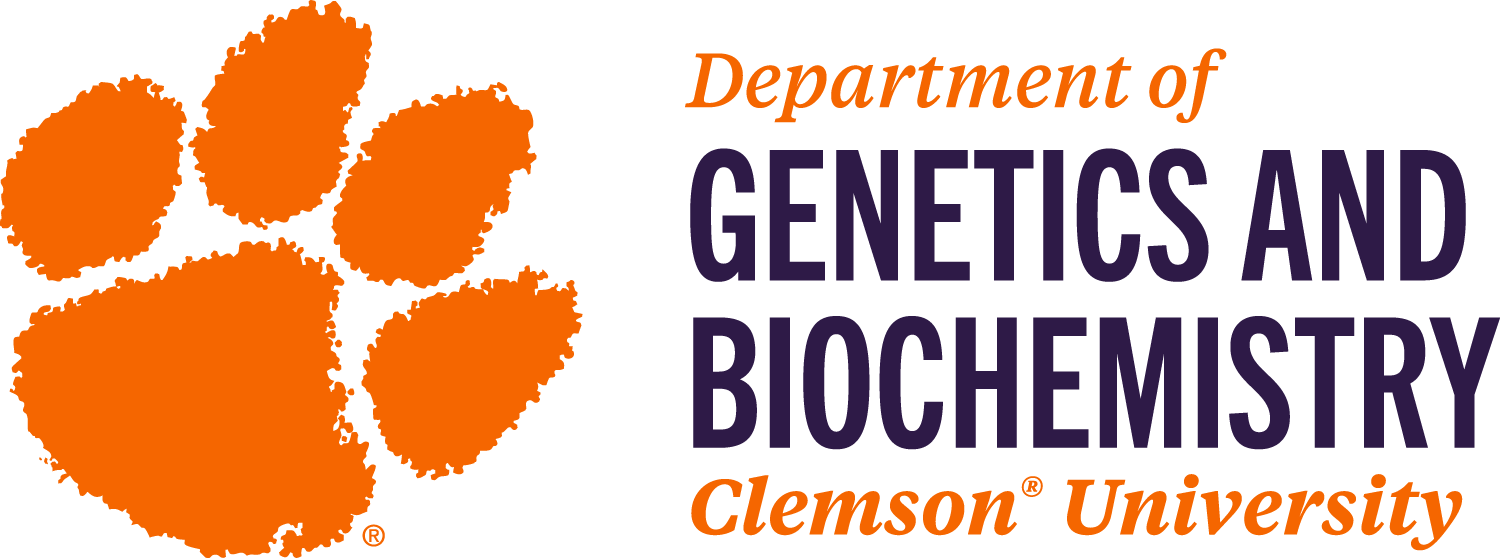Profile
Kimberly Paul
Genetics and Biochemistry
Associate Professor
864-656-1489
Life Sciences Building 240A [Office]
Educational Background
B.A., Biology, Northwestern University, 1991
Ph.D., Molecular Biology, Princeton University, 1998
Profile/About Me
Dr. Kimberly Paul first heard about Tsetse flies as a child. Her father told many stories that involved Tsetse Fly, a bold worldly fellow with a big appetite. After that fanciful introduction, she was practically fated to work on African Sleeping Sickness, although it took her nearly 2 decades to get around to it.
She first entertained a medical career, but caught the science bug while working as an undergraduate researcher at Northwestern University. After graduating with a BA in Biology, Dr. Paul traveled east to Princeton University and earned her PhD in Molecular Biology working on protein and lipid trafficking inside the cell. While in graduate school, she attended a conference session on host-pathogen interactions that introduced her to the fascinating world of parasite biology. So inspired, she switched to the field of molecular parasitology, attending the prestigious Biology of Parasitism summer course at the Marine Biological Laboratory before starting her post-doctoral research at Johns Hopkins School of Medicine. At Hopkins she finally came full circle and began working on African Sleeping Sickness.
Dr. Paul joined Clemson University in 2005 and is currently an Associate Professor in the Genetics & Biochemistry department, and she is a founding member of the Eukaryotic Pathogens Innovation Center (EPIC). Her research team investigates fatty acid metabolism in trypanosomes, including Trypanosoma brucei, the causative agent of African Sleeping Sickness. Her teaching includes courses on biochemistry and eukaryotic pathogens. Whether in her research lab or through her teaching, Dr. Paul especially enjoys introducing students to the strange and wonderful world of parasites and the worthy cause of working on Neglected Tropical Diseases.
Research Interests
Keywords: Microbiology, Parasitology, Biochemistry, Metabolism, Cell Biology, Lipids
Trypanosomes are single-celled eukaryotes that comprise both free-living and pathogenic species. We are currently studying three species of trypanosomes that present an array of life histories and host-pathogen interactions: Trypanosoma brucei, a mammalian pathogen transmitted by Tsetse flies that causes African Sleeping Sickness, Crithidia fasciculata, a mosquito pathogen, and Bodo saltans, a free-living trypanosome. My lab is interested in how trypanosomes modulate the metabolism of a key nutrient class, fatty acids, in response to its environment and during progression through its life cycle. Fatty acids are not only an important structural component of membranes and a source of energy, but in the case of T. brucei at least, they also are implicated in immune evasion.
Relatively little is known about fatty acid metabolism in these evolutionarily ancient eukaryotes. Indeed, what we have learned about fatty acid synthesis in these organisms suggest that trypanosome fatty acid metabolic pathways may be quite diverged from higher eukaryotes, and therefore may be valuable for the identification of potential new drug targets for Trypanosome diseases, for improving our understanding of how basic metabolic processes have developed and evolved over time, and may contribute to a better understanding of these pathways as they function in mammals.
Currently, we are using a variety of genetic, biochemical, and cell biological tools to pursue questions in four main research areas:
(1) How do trypanosomes regulate fatty acid synthesis in response to the needs of the parasite and the environmental lipid supply?
(2) What is the role of fatty acid metabolism in pathogenesis and immune evasion in parasitic trypanosomes?
(3) What are the molecular mechanisms governing fatty acid uptake in trypanosomes?
(4) What are the components of the trypanosome lipid droplet machinery?
Research Group (Lab)
Current Research Group:
Nava Poudyal, PhD Candidate
Joshua Saliutama, PhD Candidate
Kristina Parman, PhD Candidate
Solangie Pulido-Gomez, Undergraduate
Gracie Dellinger, Undergraduate
Bailey Holder, Undergraduate
Kshiraj Talati, HS student
Courses Taught
Biochemistry of Metabolism BCHM 4320/6320 (Spring)
Senior Seminar HIV: Plague of the 20th Century BCHM 4930 (Fall)
Creative Inquiry: Biology of Lipids and Lipid Droplets in Trypanosomes
Creative Inquiry: The Mary Bruce Project: Women and the Golden Age of Tropical Medicine
Selected Publications
Kafková, L., Tu, C., Pazzo, K.L., Smith, K.P., Debler, E.W., Paul, K.S., Qu, J., and Read, L.K. (2018) Trypanosoma brucei PRMT1 is a nucleic acid binding protein with a role in energy metabolism and the starvation stress response. mBio 9(6): e02430-18. DOI: 10.1128/mBio.02430-18. PMCID:PMC6299225.
Ray, S.R., Wilkinson, C.L., and K.S. Paul. (2018) Regulation of Trypanosoma brucei Acetyl-Coenzyme A Carboxylase by Environmental Lipids. mSphere 3: e00164-18. PMCID:PMC6041502.
Goldston, A.M., Sharma, A.I., Paul, K.S., and Engman, D.M. (2014) Acylation in Trypanosomatids: An Essential Process and Potential Drug Target. Trends in Parasitology 30(7): 350-360. PMCID:PMC4190163.
Vigueira, P.A., Ray, S.S., Martin, B.A., Ligon, M.M., and Paul, K.S. (2012) “Effects of the green tea catechin (-)-epigallocatechin gallate (EGCG) on Trypanosoma brucei brucei.” International Journal for Parasitology: Drugs and Drug Resistance 2: 225-229. PMCID:PMC3862400
Vigueira, P.A., Paul, K.S. “Trypanosoma brucei: Inhibition of acetyl-CoA carboxylase by haloxyfop.” (2011) Exp. Parasitol. 130: 159-165. PMCID: PMC3264756.
Vigueira, P.A., Paul, K.S. “Requirement for Acetyl-CoA Carboxylase in Trypanosoma brucei is Dependent Upon the Growth Environment.” (2011) Mol. Microbiol. 80: 117 -132. PMCID: PMC3656591.

